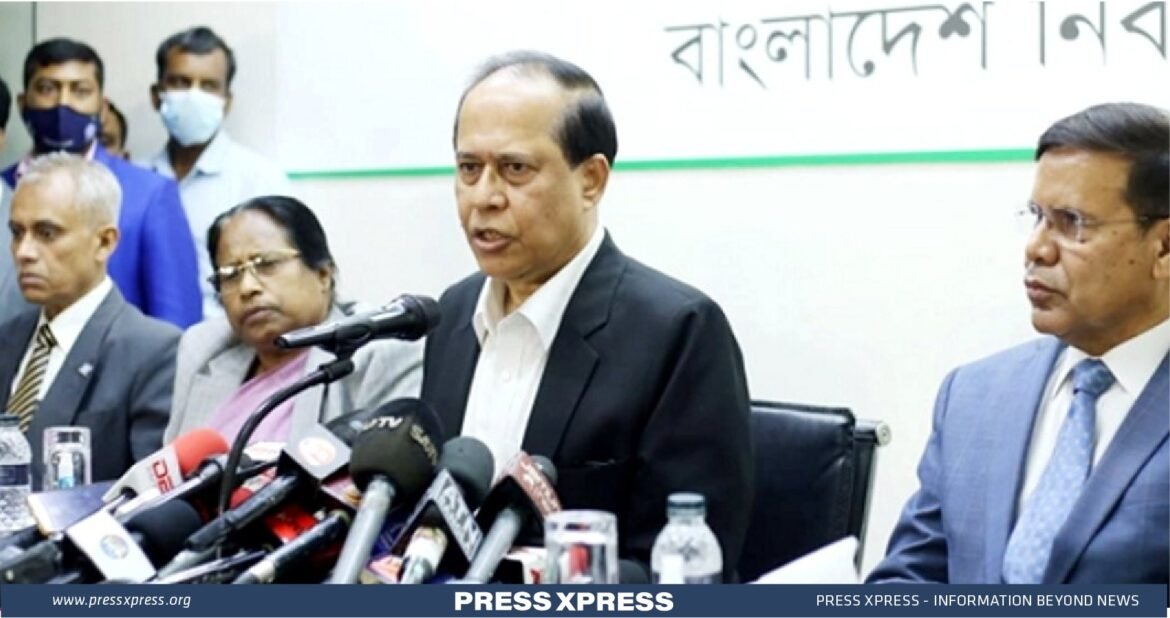Chief Election Commissioner Kazi Habibul Awal emphasized the importance of tackling irregularities and directed the Presiding Officers to act as CECs in polling stations and take preventive measures. If necessary, they will seek the assistance of magistrates and law enforcement agencies and, if irregularities persist, suspend polling at a venue and reschedule it.
While asking about the possibility of nationwide irregularities Chief Election Commissioner Kazi Habibul Awal said that in case of significant voting irregularities, the entire national election will be postponed and rescheduled. He announced this at the EC Secretariat on a workshop “Twelfth National Assembly Elections: Role of Media, Expectations of the Nation” on October 26, 2023.
You can also read: CEC Aims to Uphold Neutrality
EC’s Standpoint about the Upcoming 12th National Election
EC wants to arrange a free and fair Election in Bangladesh. The Election Commission is preparing for the 12th parliamentary election in January, but political and administrative issues remain unresolved. The 90-day countdown to the election is about to begin, but the disagreement over the nature of the election-time government persists. The EC has made several preparations, including redrawing constituencies, registering new political parties, updating the voters’ list, and amending electoral laws. They have also approved local and international observers for monitoring the polls. However, the majority of election commissioners believe that the conditions for a free, fair, and participatory election are not yet met due to political parties’ differences. But still, the EC calls for a free and fair election for the upcoming 12th National election and they give commitment for a fair election.
On October 26, Chief Election Commissioner Kazi Habibul Awal declared that the general election would take place on schedule even though the conditions needed to hold a free, fair, and participatory election had not yet been met.
The EC plans to hold a multi-party workshop to facilitate discussions among the political parties. The election is constitutionally required to take place within 90 days before the parliament’s term ends, and it’s likely to be scheduled for early January 2024.
The Chief election commissioner said about that If the irregularities in the 12th national election cannot be effectively addressed, polling will be stopped across the country. But no irregularities will be tolerated.
Challenges for the 12th National Election
The upcoming election may face challenges. It can be domestic or International.
Domestic Challenges
The Election Commission (EC) identified a lack of political parties’ confidence as a major issue. The timing of sending ballot papers to polling stations remains undecided. A significant obstacle is the unresolved dispute between political parties regarding the election-time administration. The BNP insists on a caretaker government, while the Awami League advocates for the election under the current government according to the constitution, which the BNP believes would not be fair.
Despite the EC’s efforts, there has been little progress in gaining the confidence of political parties. In recent months, both major political parties, the Awami League and the BNP, have held rallies across the country, indicating a potential for further challenges. It remains uncertain whether all parties will participate in the upcoming election, and the EC is preparing for the possibility that some parties, including the BNP, may choose to boycott the vote.
International Challenge
In the context of international engagement, the United States has raised concerns by placing a considerable emphasis on promoting democracy within its policy towards Bangladesh. In May 2023, the United States declared its intention to withdraw visas from individuals in Bangladesh who are involved in activities that undermine the integrity of the democratic electoral process.Throughout the past year, numerous senior U.S. government officials, including Secretary of State Anthony Blinken, U.S. Ambassador to Bangladesh Peter Haas, and State Department Counselor Derek Cholett, have made public statements advocating for the need for free and fair elections in Bangladesh. Ambassador Peter Haas’s recent actions have raised questions regarding their alignment with diplomatic norms.
Several other nations have also aligned themselves with the U.S. stance on this matter. The United Kingdom, Japan, and several other countries have echoed the U.S. calls for enhanced electoral standards, while the European Union is making preparations for an assessment mission and potential election monitoring scheduled for January.
The government strongly opposes any interference by the United Nations or foreign nations in the conduct of fair elections, as it goes against the principles of the country. As per the constitution of our nation, every effort has been made to ensure that a free, fair, and impartial election is accessible to all, regardless of their political affiliations. The upcoming national parliamentary election is just a few months away, and the Independent Election Commission is actively making preparations to ensure its fairness and impartiality.
During this critical juncture in our country’s democratic process, various domestic and foreign groups with ulterior motives have engaged in deceitful and unjust activities, essentially muddying the waters. Particularly, certain elements within the international community are making attempts to influence Bangladesh’s election process through various means, a situation that is far from desirable. It’s important to emphasize that, as an independent and sovereign nation, our national elections are purely an internal matter for Bangladesh and should remain free from external influence.
Conclusion
Chief Election Commissioner Kazi Habibul Awal has announced the determination of the Election Commission (EC) to proceed with the 12th National Election despite challenges. The EC seeks to ensure a free and fair election but faces political disputes over the election-time government. Internal and international factors add complexity to the process, but the EC remains committed to addressing irregularities and conducting a successful election. The upcoming election in Bangladesh is marked by emphasizing the need for open dialogue and cooperation among all stakeholders. International scrutiny and expectations add to the complexity of the situation, reinforcing the importance of conducting a credible election.


